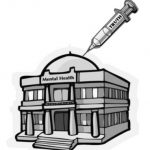Does Your Mental Health Care Need a Truth Injection?
Updated 22 August 2022
Based off our original popular brochure from around 2009, we hope to once again help people affected by the mental health system tackle these common myths about mental health and mental health care. THe original authors were mental health worker Ron Unger and MindFreedom co-founder David W. Oaks.
Thanks to the amazing intern Maria Rose for helping update and distribute this important educational material! Over the next few weeks, we will be publishing these myth-busting facts, both here and on our Instagram page.
Learn about the reality behind these common myths, and help us stand up for truth and freedom for all affected by the mental health system. Together we can shine a bright light of reality on mental health!
If you can help translate any or all of these into your own native language, we would greatly appreciate it. Just email MFI Social Media Manager & volunteer Ian M. at: socialmedia@mindfreedom.org
This should not be treated as medical or legal advice, and is for educational purposes. Please always do your own research. Citations and sources can be found at the bottom of this page.
Why We Created the Original Brochure
More than a decade ago, MindFreedom International (MFI) released what would be our most widely distributed educational work, debunking commonly believed myths about mental health care. Ron Unger, an experienced mental health worker, and David W. Oaks, a psychiatric survivor and our former executive director, worked together to create this brochure to help dispel these various myths that are used to justify the mistreatment of people by the mental health system, as well as the domination of the "medical model" of mental health.

Investigative journalist Rob Wipond once described the issue of advocating for mental health rights as a "knot of wires" that has to be "untangled." There are many core myths we have to debunk, but unlike a house of cards (which falls completely apart when any one card is removed or one myth is debunked,) in a knot of wires, a whole tangle of related, intertwined myths have to be loosened and removed simultaneously.
We hope this new, living version of the "Truth Injection" brochure will help psychiatric survivor, mental health consumer, and neurodivergent activists, new and old, tackle these common myths when advocating for our rights. With the input of original authors, Ron Unger and David Oaks, and help from MindFreedom intern Maria Rose and volunteer Ian M., we hope to revitalize this important educational work and make it available on more platforms for an even wider audience.
For TRUTH In The Mental Health System!
Citations and Sources
Baughman, Fred.
“There Is No Such Thing as a Psychiatric Disorder/Disease/Chemical Imbalance.” PLOS Medicine, PLOS, 25 July 2006, https://journals.plos.org/plosmedicine/article?id=10.1371/journal.pmed.0030318.
Eske, Jamie.
“Chemical Imbalance in the Brain: Myths and Facts.” Medically Reviewed by Heidi Moawad, M.D. Medical News Today, MediLexicon International, 26 Sept. 2019, https://www.medicalnewstoday.com/articles/326475.
Gøtzsche, Peter C et al.
“Does long term use of psychiatric drugs cause more harm than good?.” BMJ (Clinical research ed.) vol. 350 h2435. 12 May. 2015. https://www.ncbi.nlm.nih.gov/pmc/articles/PMC4707562/.
Harrow, Martin & Thomas H. Jobe.
“Factors Involved in Outcome and Recovery in Schizophrenia Patients Not on Antipsychotic Medications: A 15-Year Multifollow-up Study.” Journal of Nervous & Mental Disease, vol. 195, no. 5, 2007, pp. 406–414., https://doi.org/10.1097/01.nmd.0000253783.32338.6e.
Holmes, G.
“Helping people to come off neuroleptics and other psychiatric drugs.” Clinical Psychology Forum, 163 (2006), 21-25. https://www.psychologyintherealworld.co.uk/resources/helping_people_come_off_antipsychotic_meds.pdf.
Jacob, K. S.
“Recovery model of mental illness: a complementary approach to psychiatric care.” Indian Journal of Psychological Medicine vol. 37,2 (2015): 117-9. doi:10.4103/0253-7176.155605
Kapur, S., Phillips, A. & Insel, T.
Why has it taken so long for biological psychiatry to develop clinical tests and what to do about it?. Mol Psychiatry 17, 1174–1179 (2012). https://doi.org/10.1038/mp.2012.105.
Mahlke, C.I., et al.
“Effectiveness of One-to-One Peer Support for Patients with Severe Mental Illness – a Randomised Controlled Trial.” European Psychiatry, vol. 42, 2017, pp. 103–110., doi:10.1016/j.eurpsy.2016.12.007.
Moncrieff, J., Cooper, R.E., Stockmann, T. et al.
The serotonin theory of depression: a systematic umbrella review of the evidence. Mol Psychiatry (2022). https://doi.org/10.1038/s41380-022-01661-0.
Mosher LR, Vallone R, Menn A.
The Treatment of Acute Psychosis Without Neuroleptics: Six-Week Psychopathology Outcome Data From the Soteria Project.” International Journal of Social Psychiatry. 1995; 41(3):157-173. doi: 10.1177/002076409504100301.
Mosher, Loren R.
"Non-hospital, non-drug intervention with first-episode psychosis." Models of madness: Psychological, social and biological approaches to schizophrenia (2004): 249-364.
Settle Jr, Edmund C.
"Antidepressant drugs: disturbing and potentially dangerous adverse effects." Journal of Clinical Psychiatry 59.16 (1998): 25-30.
Topor, Alain
Managing the contradictions: Recovery from severe mental disorders. Diss. Department of Social Work, Stockholm University, 2001. https://www.diva-portal.org/smash/record.jsf?pid=diva2%3A302582&dswid=-665.


